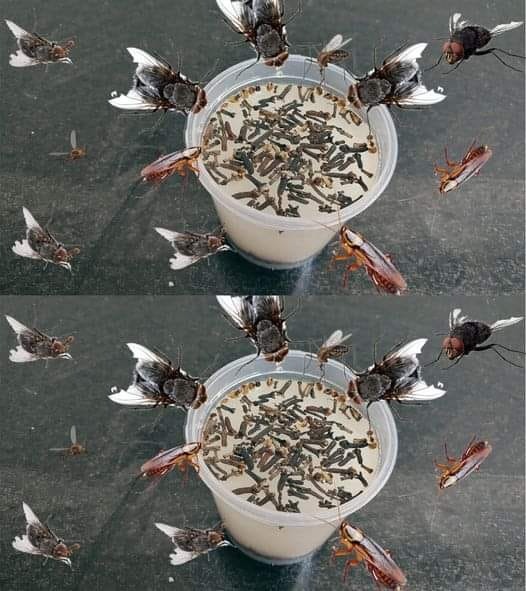ADVERTISEMENT
#### **Mosquitoes: A Persistent Problem**
Mosquitoes are attracted to humans primarily by the carbon dioxide we exhale, as well as body heat and sweat. They lay their eggs in standing water, making places like ponds, birdbaths, clogged gutters, and even small containers that collect rainwater ideal breeding grounds. Once mosquitoes hatch, the larvae develop in the water before becoming flying adults.
**Health Risks:**
– Mosquitoes can transmit deadly diseases, making them one of the most dangerous creatures on earth.
– Even in areas without serious diseases, their bites can cause itching, discomfort, and allergic reactions.
#### **Cockroaches: Resilient Survivors**
Cockroaches are hardy insects that thrive in dark, warm, and humid environments, often in kitchens and bathrooms. They are nocturnal and tend to hide during the day. Roaches are notorious for their ability to breed quickly, and a single female can produce hundreds of offspring in her lifetime.
**Health Risks:**
– Cockroaches carry and spread harmful bacteria, including E. coli and Salmonella, which can contaminate food and surfaces.
– Their droppings and shed body parts are allergens that can trigger asthma attacks, especially in children.
Both mosquitoes and cockroaches are persistent, and the challenge lies in controlling their populations in a way that is safe for the home environment. Below, we’ll explore several home remedies for keeping both pests at bay.
—
### **Effective Home Remedies for Mosquito Control**
When it comes to mosquitoes, prevention is key. While it’s impossible to eliminate them entirely, there are several natural ways to deter them from your home and property.
#### **1. Eliminate Standing Water**
Since mosquitoes lay their eggs in water, eliminating all sources of standing water around your home is the first step in controlling their population.
– **How to Do It:**
– Check your yard for puddles or containers like flower pots, buckets, or even discarded tires where water may collect.
– Make sure that rain gutters are clear and water can flow freely.
– If you have a pond or birdbath, regularly change the water to prevent it from becoming a breeding ground.
– Fill in low spots in your yard where water can pool.
By eliminating water sources, you remove the mosquitoes’ primary breeding grounds, significantly reducing their numbers over time.
#### **2. Use Essential Oils to Repel Mosquitoes**
Essential oils are a safe and natural way to keep mosquitoes away. Some oils have been shown to repel mosquitoes effectively.
– **Essential Oils That Work:**
– **Citronella**: A well-known mosquito repellent, citronella oil can be used in candles or applied to the skin (when diluted).
– **Eucalyptus**: Eucalyptus oil contains citronellal, a compound that mosquitoes find repellent.
– **Lavender**: Known for its calming properties, lavender oil can also keep mosquitoes at bay.
– **Tea Tree**: Tea tree oil is another powerful mosquito repellent due to its strong scent.
– **Lemon or Lime**: The citrusy scent of lemon and lime oils is unpleasant to mosquitoes.
– **How to Use:**
– **Essential Oil Sprays**: Mix 10–20 drops of your chosen essential oil with a carrier oil (like coconut or olive oil) or water in a spray bottle. Shake well and spray on your skin or around your home.
– **Essential Oil Diffusers**: Place a few drops of essential oil into a diffuser, which will spread the repellent scent throughout the room.
– **Candles**: Light citronella candles or make your own by adding a few drops of citronella essential oil to melted wax.
These oils are effective and safe alternatives to chemical repellents, and their pleasant aromas can make your home smell wonderful while keeping mosquitoes away.
#### **3. Plant Mosquito-Repellent Plants**
Another natural way to repel mosquitoes is by incorporating mosquito-repellent plants into your garden or patio. Some plants emit fragrances that mosquitoes find unpleasant.
– **Mosquito-Repellent Plants:**
– **Lemon Balm**: This herb has a strong lemon scent, which mosquitoes dislike.
– **Marigolds**: These vibrant flowers contain pyrethrum, a compound used in many insecticides.
– **Basil**: Not only useful in cooking, basil’s scent repels mosquitoes.
– **Mint**: Mosquitoes can’t stand mint, making it an excellent addition to your garden.
– **Catnip**: Studies have shown that catnip can be even more effective than DEET at repelling mosquitoes.
Planting these herbs and flowers around your home, especially near entry points like windows or doors, will help keep mosquitoes at bay while adding beauty to your garden.
#### **4. Install Mosquito Traps**
A mosquito trap is a great way to reduce the mosquito population in your yard. Some homemade traps can be highly effective and cost-efficient.
– **DIY Mosquito Trap:**
– Cut a plastic bottle in half.
– In the bottom half, combine 1 cup of water, 1/4 cup of brown sugar, and 1 tablespoon of dry yeast.
– Place the top half of the bottle upside down into the bottom half (like a funnel), and secure with tape.
– Mosquitoes are attracted to the carbon dioxide produced by the yeast, and they will fly into the trap but won’t be able to escape.
By setting up multiple traps in your yard, you can effectively reduce the number of mosquitoes and disrupt their breeding cycle.
For Complete Cooking STEPS Please Head On Over To Next Page Or Open button (>) and don’t forget to SHARE with your Facebook friends
